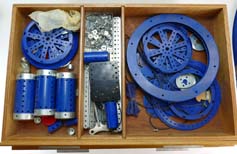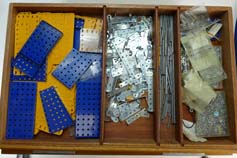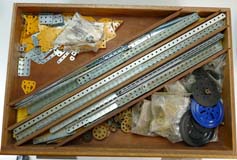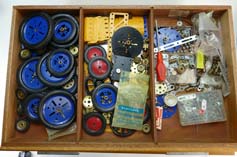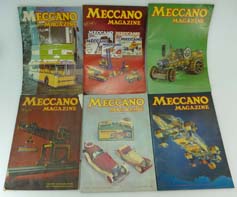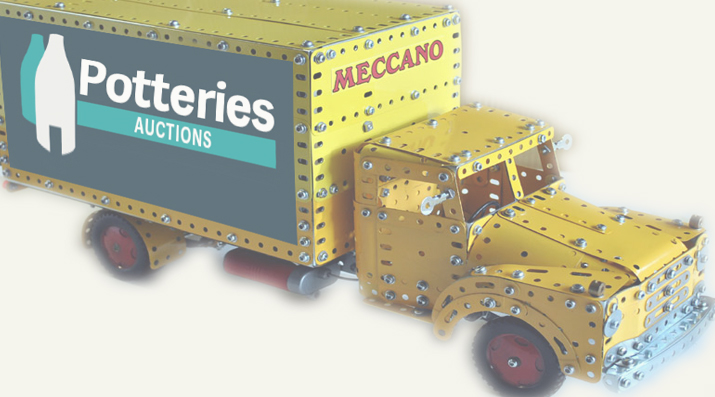
MECCANO
Meccano is a model construction system created in 1901 by Frank Hornby, a clerk from Liverpool, United Kingdom. The toy that Frank Hornby invented, “Mechanics Made Easy”, was based on the principles of mechanical engineering.
The model construction kit consists of reusable perforated metal strips, plates, angle girders, wheels, axles, gears and plastic parts that are connected together using nuts, bolts and set screws. Meccano enables the building of working models and mechanical devices.
The only tools required to assemble models were a screwdriver and spanners. This was more than just a toy, it was educational, teaching basic mechanical principles like levers and gearing.
In 1913, a very similar construction set was introduced in the US under the brand name Erector. Meccano bought the Erector brand and unified its presence on all continents.
The word “Meccano” was thought to have been derived from the phrase “Make and Know”.
Initially the parts for Hornby’s new construction kit were supplied by outside manufacturers, but as demand began to exceed supply, Hornby set up his own factory in Duke Street, Liverpool. As the construction kits gained in popularity they soon became known as Meccano and went on sale worldwide. In September 1907, Hornby registered the Meccano trade mark and in May 1908, he formed Meccano Ltd. To keep pace with demand, a new Meccano factory was built in 1914, in Binns Road, Liverpool. This became Meccano Ltd.’s headquarters for the next 60 years. Hornby also established Meccano factories in France, Spain and Argentina.
The first construction sets had parts that were rather crudely made, the metal strips and plates had a tinplate finish, they were not rounded at the ends and were not very sturdy. However, manufacturing methods were improving all the time and by 1907 the quality and appearance had improved considerably, the metal strips were made of thicker steel with rounded ends and were nickel-plated, while the wheels and gears were machined from brass.
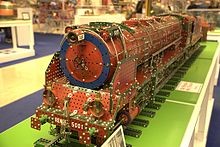
The first sets under the new Meccano name were numbered 1 to 6. In 1922 the No. 7 Meccano Outfit was introduced, which was the largest set of its day, and the most sought after because of its model building capabilities and prestige.
In 1926, to mark the 25th anniversary of his patent, Hornby introduced “Meccano in Colours” with the familiar red and green coloured Meccano pieces. Initially plates were a light red and items like the braced girders were a pea-green. However, the following year strips and girders were painted dark green, the plates Burgundy red, while the wheels and gears remained brass. In 1934 the Meccano pieces changed colour again, the strips and girders became gold and the plates were changed to blue with gold criss-cross lines on them, but only on one side, the reverse remained plain blue. This new colour scheme was only available in the United Kingdom until the end of the Second World War in 1945. The old red and green sets were still produced for the export market and were re-introduced in the UK after the war.
In 1958 the colours were changed slightly to what became known as ‘light red and green’ but this had the shortest lifespan as the colours changed dramatically in 1964 to the black and yellow colour scheme. However, this light red and green period did see the introduction of about 90 new parts, more modern packaging, a new cabinet was introduced for the number 10 set, the first plastic parts were introduced, and the “exploded diagram” instructions made their début.
The No. 10 Outfit became Meccano’s flagship set and remained relatively unchanged until it was discontinued in 1992.
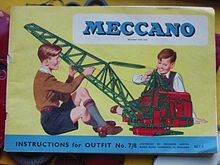
World War II interrupted the production of Meccano in England when the Binns Road factory converted to manufacturing for the war effort. The Korean War in 1950 also disrupted production due to a metal shortage and it was not until the mid-1950s that Meccano production returned to normal with new parts being added to all the sets.
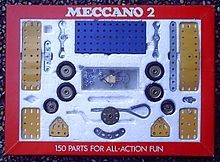
In the early 1960s Meccano Ltd experienced financial problems and was purchased by Lines Bros Ltd who operated under the brand name “Tri-ang”. In an attempt to redefine Meccano’s image, the colour scheme was changed to yellow and black plates, with silver strips and girders. The silver was soon replaced by zinc in 1967 when it was found that the silver pieces marked easily. The colours of yellow and black were chosen because they were the colours typically used by most large construction vehicles of the day.
Electronic parts were introduced in 1970 and the current black-coloured plates were changed to blue. The range of sets was reduced by one with the deletion of the old No. 9 set and the renumbering of the old No. 0 to 8 sets to No. 1 to 9. The No. 10 set remained unchanged.
In 1971, Lines Brothers went into voluntary liquidation and Airfix Industries purchased the Meccano business in the UK and General Mills of the US purchased the French business. The French company was known as Miro Meccano.
In 1978 the range of Meccano sets was reduced and changed with the replacement of the No. 2 to 8 sets by six completely new sets, labelled A and 1 to 5. The old No. 9 and 10 sets were left largely unchanged. Unfortunately, Airfix shut down the Binns Road factory, bringing to an end the manufacture of Meccano in England.
Meccano was still manufactured in France, as the British and French businesses had different owners. Meccano France made the famous dark blue and red Construction SET 1 to SET 10 Boxes Series until the early 1990s.
Potteries Auctions has a ‘Meccano Outfit No. 10’ in the July 15th Antiques, Rare Pottery & Fine Art Auction, if Meccano is something that you have an interest in, this lot will be for you!
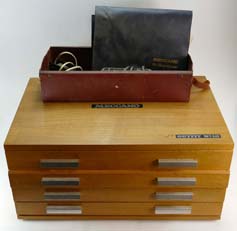
Lot 916 – The Ultimate Meccano Set, outfit number 10, with blue and yellow pieces, together with it’s original oak veneered 4 drawer chest. Also included are several magazines and manuals, Meccano motor and Hornby power control unit, made, of course, by Meccano. This is really as good as Meccano sets get. Scarce in this condition – contains a huge quantity of Meccano, not known if this is complete as issued or not.
Estimate £800.00 – £1,600.00
